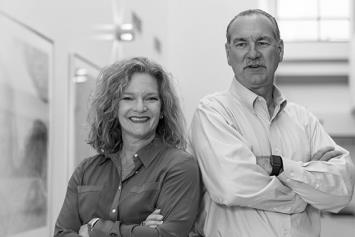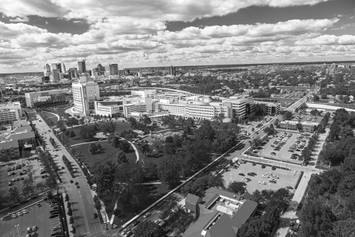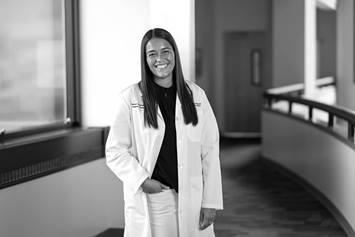Medical Biochemical Genetics Fellowship
Medical Biochemical Genetics Fellowship
Nationwide Children’s Hospital offers a one-year Medical Biochemical Genetics Fellowship for geneticists pursuing training to be eligible for an ABMGG Medical Biochemical Genetics subspecialty.
The one-year, ACGME-accredited Medical Biochemical Genetics Fellowship prepares our graduates for the ABMGG Medical Biochemical Genetics subspecialty board examination. Fellows who complete the fellowship will be fully competent to provide the highest level of subspecialty care in this field.
The goal of this program is to train biochemical geneticists with in-depth biochemical knowledge, who can think critically and use the best available evidence in order to diagnose and manage patients with inborn errors of metabolism through the course of the patient’s life, while directing a team of nurses, nurse practitioners, genetic counselors and dieticians. The program will build a foundation of research and scholarship upon which incoming fellows can begin a career of academic inquiry in biochemical genetics with a focus in either bench research, informatics, and/or clinical/translational research.
What You Need to Know
Curriculum
- Metabolic, Continuity and Therapeutic Lysosomal Disease Clinic – Monday, Thursdays. Urgent NBS follow up-clinics.
- Metabolic consults
- Follow up of positive newborn screening results
- Daily review of plasma amino acids, acylcarnitine profiles and urine organic acids results in the in-house biochemical laboratory.
- Weekly lectures on metabolic pathways and a management of patients with inborn errors of metabolism.
- Weekly metabolic rounds
- Weekly general genetics conference
- Weekly pediatric grand rounds
- Monthly journal clubs
- Monthly fellow case presentation
- 3-week laboratory rotation
- The Ohio Newborn Screening Advisory Committee meetings (Three times a year)
- The North American Metabolic Academy sponsored by the Society for Inherited Metabolic Disorders (If not previously attended)
The fellow will work directly with the attending for acute inpatients, and the attending will expect the fellow to make an initial attempt at suggesting the diagnostic and treatment plan. Over the course of the year the faculty will gradually shift from direct supervision to indirect supervision. In the final 1-2 months of the fellowship, the trainee will provide care with faculty providing oversight.
Fellows will participate in metabolic clinics to learn from the attending physicians, as well as the rest of the comprehensive metabolic team (including the nurse, nurse practitioners, dietician, and genetic counselor). Later in the training, the trainee will take primary responsibility for determining the management/treatment plan for the patients and providing continuous care. Fellows will have hand-on learning opportunities in enzyme replacement therapy and liver transplant/HSCT as treatment options.
Fellows will receive broad exposure to the spectrum of IEMs screened in Newborn screening, common false positives, interpretation of extended datasets from the state NBS lab, use of the predictive algorithms to determine relative risk of true positives.
Fellows are expected to provide monthly 30 minute didactic lectures to the Medical Genetics residents and pediatric inpatient ward team on the evaluation and treatment of common metabolic disorders.
Research
Fellows are expected to participate in scholarly activity during their training. Excellent opportunities for clinical or collaborative research projects exist within the department, the Research Institute, the Institute for Genomic Medicine, and the Center for the Gene Therapy. An additional second year of training (bench or clinical research) is an option for fellows who desire to pursue an academic/research career. Fellow Research Seminar series are available through our Research Institute. Fellows are expected submit an abstract for presentation at the annual Society for Inherited Metabolic Disorders meeting (or equivalent international meetings such as SSEIM) and to apply for the travel award.
Genetics at Nationwide Children’s
Genetic and Genomic Medicine maintains a very active program in the diagnosis and management of metabolic disorders, including NBS follow-up, enzyme replacement therapy and active research in the field of metabolic medicine.
Our team consists of seven clinical geneticists (three biochemical geneticists), 14 pediatric genetic counselors, two dieticians, three nurse practitioners, a metabolic nurse and full genetics laboratory services (cytogenetics, molecular and biochemical genetics).
The Division supports a Medical Genetics Residency and fellowships in Molecular Genetics/Cytogenetics.
Nationwide Children’s Hospital is one of eight Regional Genetics Centers funded by the Ohio Department of Health.
Salary and Benefits
Our fellows are hospital employees, and as such, they are eligible for the same benefits other full-time staff receive (with the exception of paid time off, which is outlined). Click here to learn more about fellowship benefits.
Research
Research education and training are vital to the mission of Nationwide Children's Hospital and The Abigail Wexner Research Institute at Nationwide Children's Hospital. As a top-ten free-standing pediatric research center and an academic affiliate of The Ohio State University, The Research Institute has an outstanding faculty, dedicated to training and mentoring the next generation of scientists in pediatric research.
Research at Nationwide Children's Hospital
Advocacy
Advocacy training fosters and encourages interest in child advocacy by early involvement and exposure to its many aspects such as addressing social determinants of health, community collaboration, health finance, health policy and legislative advocacy.
Application and Interview Process
We accept one fellow per year.
Interested applicants must have:
- Valid state license (includes training license)
- Board certification or board eligibility in Medical Genetics and Genomics
We have a rolling acceptance policy. We encourage you to apply early during the interview season (July – September).
To apply, please submit your CV and three letters of reference (one from a Genetics Program Director) to:
Mari Mori, MD
Program Director
Mari.Mori@NationwideChildrens.org
Mallory Birt
Education Coordinator
Mallory.Birt@NationwideChildrens.org
Contact Information
For more information, please email GeneticsResidency@NationwideChildrens.org, or contact the program director or education coordinator:
William Burns, MD
Program Director
William.Burns@NationwideChildrens.org
Lauren Phipps, CHES
Education Coordinator
Lauren.Phipps@NationwideChildrens.org



